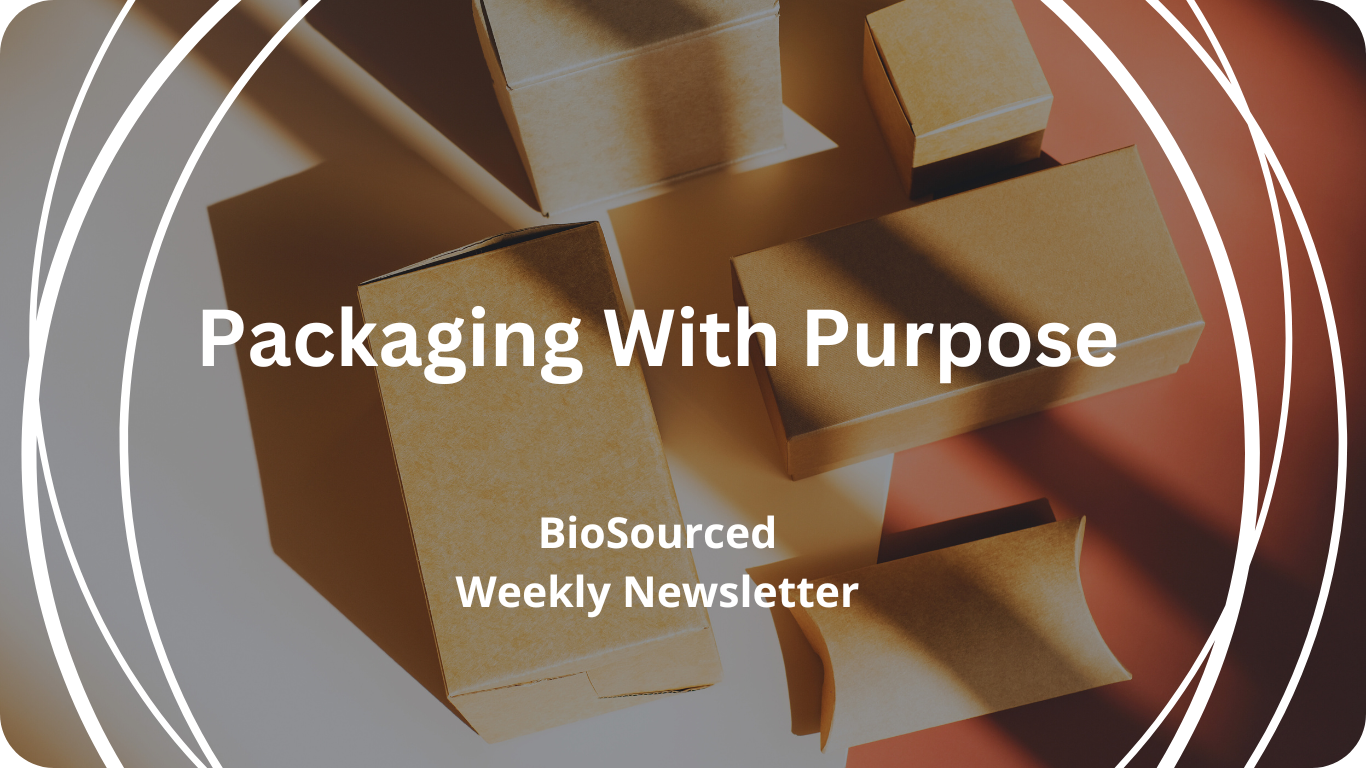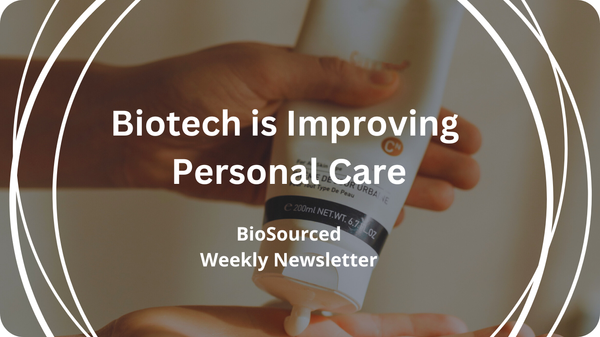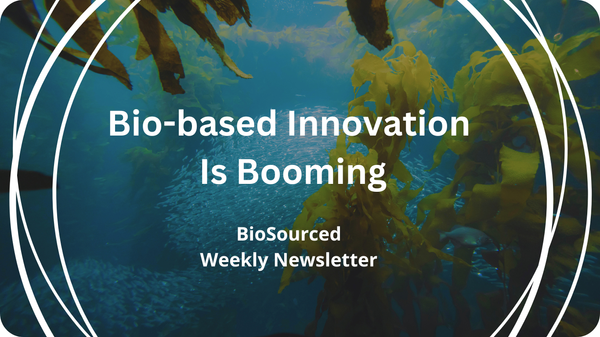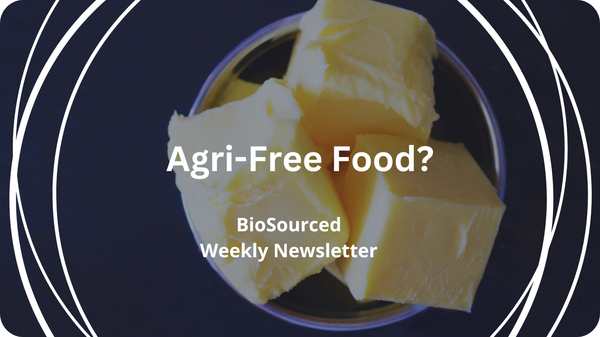Packaging With Purpose: Innovations, Challenges, and Big Questions
PLUS: CO₂ and waste-based materials, new certifications, and an unmissable opportunity for disruptive innovators.

Single-use plastics still dominate global packaging—and they’re not going down without a fight.
While half of our plastics are designed for single-use purposes, this category accounts for about 89% of plastic pollution in the ocean, resulting in a wave of bans from the UK to Chile, China, Kenya and several US states. Meanwhile, the EU plans to phase out most single-use plastics by the end of the decade, setting the tone for global reform. But the road to circularity is anything but straightforward. This week’s updates show how far we’ve come—and remember how far we still need to go.
🌱 New Products & Certifications
🍽 Xampla, Huhtamaki & Just Eat Takeaway’s Packaging
Following its ongoing partnership with UK Seaweed packaging brand Notpla, Just Eat Takeaway’s German branch (Lieferando) is collaborating with British material innovator Xampla and Finnish packaging leader Huhtamaki to trial plastic-free packaging.
Huhtamaki’s recyclable takeaway boxes, made from sustainably sourced corrugated paper, are now lined with Xampla’s Morro coating, a 100% bio-based, PFAS-free solution made from multiple natural plant polymers to reduce pressure on any single resource. Considering Lieferando’s community of 41,000 restaurant partners, this could be a game-changer if widely adopted.
🍫 Cocoa Husks Become Bioplastics in Vietnam Project
Helvetas Vietnam and AirXCarbon are turning local cocoa husks into biodegradable granules that can replace conventional plastics in consumer products and packaging.
The project is funded through an EU initiative and aims to tackle agricultural waste and plastic pollution. Vietnam farmers produce 50,000 tons of annual cocoa husks, exceeding demand for local compost and feed. This solution promises to divert waste and serve packaging manufacturing, aligning agricultural practices with circular goals.
🧴 Tecnaro’s Bioplastics Now FSC and PEFC Certified
The German biopolymer company Tecnaro, a spinoff of the Fraunhofer Institute for Chemical Technology (ICT), celebrates two brand new certifications.
Its ARBOBLEND, ARBOLINE and ARBOFORM compounds, made from renewable resources, are now fully certified by FSC and PEFC via DIN CERTCO. This means they can be easily integrated into existing FSC and PEFC supply chains as verifiable materials. This also marks the expansion of these certifications into the plastics industry.
What else is reverberating across the packaging industry?
- From corncobs to spandex and thermoplastics: Covation Biomaterials launches its bioPTMEG
- FLO Group & Nature Works' KeyGea, a compostable coffee cup tackling pod pollution
- Canplex profiles next-gen biodegradable resin suitable for plastic extrusion
🧪 Research & Emerging Materials
After four years of collaborative research, the multidisciplinary EU-funded CO₂SMOS project has come up with tangible results demonstrating the real-world potential of technologies converting biogenic CO₂ into high-value monomers like PHB and PHA using fermentation. It’s a powerful proof-of-concept that could bring us a step closer to scalable and cost-competitive cross-industry materials that divert waste and capture CO₂.
For those of you wondering, biogenic CO₂ is carbon dioxide released from the processing of biological materials like organic waste.
Want to read about more seemingly Sci-Fi solutions?
- Japan discovers paper-based material that can hold boiling water and disappear in the ocean
- Korean study finds common bacteria to produce biodegradable plastics
🔍 Industry & Education
📊 A New Scorecard for Safer Foodware Choices
The UP Scorecard, a free, easy-to-use, and science-based platform, is now officially available after four years of beta testing.
Built by the Single-Use Material Decelerator, a non-profit group of food service leaders, the online tool helps users identify and compare foodware food packaging using lifecycle and toxicity data.
⚖️ Lack of Bioplastics Regulation Hampers Circular Transition
A Brazilian study highlights how the absence of global standards and clear regulations for bioplastics confuses consumers and hampers sustainable action. Despite their potential, mixed definitions and labelling issues undermine trust.
The authors call for a global regulatory framework to boost transparency and market trust.
More industry insights:
- Misunderstanding of ‘green plastics’: could these be key to reducing our environmental impact?
- Asia’s bioplastics market surges on policy push
- Algae-based bioplastics market expected to grow at a CAGR of 5.5% from 2025 to 2030forward-thinking
📆 Opportunities
📍 London Packaging Week Extends Innovation Awards Deadline
After strong engagement, the London Packaging Week Innovation Awards has extended its submission window, encouraging startups and creators to submit forward-thinking, creative and disruptive packaging solutions across six categories.
⏰Deadline: May 2nd
🧠 Reflection
We’re witnessing undeniable growth in material innovation—from CO₂-based monomers to cocoa husk bioplastics. Certifications are catching up too, giving credibility to bio-based suppliers. But beneath the surface, serious challenges remain: a fractured policy landscape, greenwashing risks, and a lack of consumer clarity all threaten to undermine momentum.
For circular packaging to truly succeed, we need innovation backed by infrastructure, science supported by policy, and products trusted by the people. It’s time for the entire value chain—from regulators to recyclers—to close the loop together.
Until next time!
Nina Purton🌿





